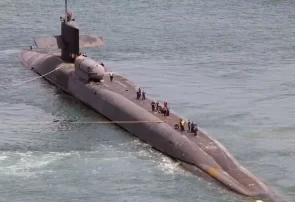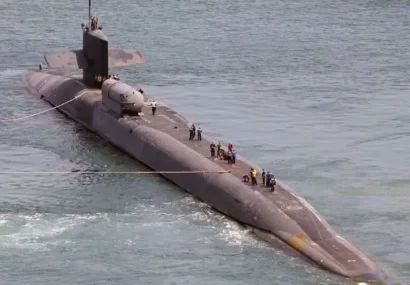TEHRAN (Iran News) –North Korea recently launched an intercontinental ballistic missile (ICBM). Pyongyang says the solid-fuel Hwasong-18 was in response to reckless military activities by the United States on its borders, including war games and the arrival of a nuclear-armed submarine.
In April, Washington said that one of its nuclear-armed ballistic submarines would visit a South Korean port for the first time in decades without specifying a date.
South Korea and the United States are set to start their major annual joint military exercises next month.
North Korea regards all such exercises as rehearsals for an invasion and has described them as “frantic” drills “simulating an all-out war against” Pyongyang.
Experts believe the U.S. moves to reinforce of its military presence on the Korean Peninsula have little to do with missile testing, but rather these attempts to establish an Asia Pacific NATO.
The U.S. is feeling very nervous about much of the world rejecting a unipolar world dominated by Washington.
The establishment of AUKUS and sending a nuclear-armed submarine goes along that objective.
Diplomacy has stalled. North Korea has not accepted the terms that the U.S. has put on the table?, which former U.S. National Security Advisor John Bolton has described as the “Libya Model”.
This is styled in a way that North Korea gives up all its military arsenal in return for some sanctions relief.
What happened to Libya?
Libya gave up everything, and NATO still went in and destroyed the country whilst killing their leader. What North Koreans officials have said is that it won’t follow that route because if Pyongyang does, the U.S.-led military alliance will destroy it.
The problem for the U.S. is that there is not much more it can do. It can’t strike North Korea or start a war, as the U.S. is already overstretched in Ukraine and elsewhere.
There is a level of delusion coming out of Washington that it has the sole right to dictate to every country on the planet.
As a result, tensions are rising. The U.S. and South Korea have increased their military cooperation. The danger is that more military provocations by the U.S. will increase the possibility of a military conflict, that would oblige all NATO members to take part in.
Pyongyang may test another ICBM, but for that to be considered as a major threat in comparison to the deployment of the U.S. and NATO military all over the world is very much out of proportion.
The UN Security Council has met to discuss Pyongyang’s ICBM launch.
The launch of an ICBM was an exercise of the right to self-defense “to deter dangerous military moves of hostile forces and safeguard the security of our state,” the North Korea’s UN envoy told the session.
North Korea Ambassador to the UN, Kim Song, said, “Our test to fire a new type of ICBM has no negative effect on the security of a neighboring country. Japan announced that our ICBM landed outside its exclusive economic zone and it is tantamount to Japan’s acknowledgment, there is no risk posed to its security.”
The ambassador pointed out “our test to fire of a new type ICBM, the Hwasong-18, is a warrant to the exercise of the right to self-defense, to deter dangerous military moves of hostile forces and safeguard security of our state and peace in the region without fear.”
He also condemned the convening of the Security Council meeting, saying it violates the UN charter on self-defense.
North Korea has also accused the U.S. of flying a spy plane into its airspace. The U.S. has “intensified espionage activities beyond the wartime level” with “provocative” spy plane flights, Pyongyang said. “There is no guarantee that such shocking accident as downing of the US Air Force strategic reconnaissance plane will not happen in the East Sea of Korea,” a North Korean defense spokesperson said.
Kim Song told the Security Council that the “military provocation by the United States and its followers against the DPRK (Democratic People’s Republic of Korea) are growing as never before, and consequently, the military security pattern in the Korean Peninsula is reaching the face of the nuclear crisis beyond the Cold War era.”
The Deputy Russian Ambassador to the UN, Anna Evstigneeva, noted that “Russia has consistently opposed any military activity which would threaten the security of the Korean Peninsula and the countries of Northeast Asia.”
She highlighted that “this meeting was convened by the United States, Albania, France, Japan, Malta and the United Kingdom regarding a missile launch. But we must once again draw attention to the actions of the U.S., the Republic of Korea and Japan, who, as part of their concept of so-called extended deterrence, continue to increase the scale of their regional exercises and their military cooperation.”
Meanwhile, China’s Permanent Representative to the UN, Zhang Ju, told the session that Beijing’s position on the Korean Peninsula is quite clear.
Zhang said, “We are committed to the denuclearization of the peninsula, maintaining the peace and stability on the peninsula and the political settlement of the issue through dialogue. The current situation in the Korean Peninsula continues to be tense and is getting ever more confrontational, which is not what China wishes to see. China has taken note of the DPRK recent launch.”
China’s Representative warned, “The Cold War has long since ended, but the specter of the Cold War mentality lingers. It has not only rendered the peninsula issue intractable, but also intensified and antagonism and conflict around the world.”
Zhang further denounced NATO’s ongoing Cold War mentality, saying, “To this day, NATO, as a product of the Cold War, has been mired in this specter to extricate itself. The communique issued by the recent NATO summit in Vilnius was as long-winded as it was harping the same old tunes filled with Cold War mentality and ideological prejudices. The communique disregards basic facts and makes far-fetched, irrelevant, and unwarranted attacks and accusations against China. China firmly rejects these utterly hypocritical recriminations.”
He added that “China does not cause trouble, nor does it fear trouble.” The diplomat warned “we stand ready to respond firmly and forcefully to any acts that violate China’s sovereignty and territorial integrity, undermine China’s development and security interests, and breach the peace and stability in China’s neighborhood.”
North Korean leader Kim Jong Un personally oversaw the successful test of the country’s newest intercontinental ballistic missile, state media reported.
The launch came days after Pyongyang threatened to down any U.S. spy planes entering its airspace.
According to North Korean media, leader Kim has vowed stronger military launches and military advancements until the U.S. and South Korea changed their policies towards North Korea.
Citing the “unstable situation” on the peninsula, Kim has also been cited as calling for “more intense efforts” to boost North Korea’s nuclear arsenal.
Kim’s sister Kim Yo Jong also slammed the U.S. airspace violations, and warned that North Korea would take “decisive action” if its maritime military demarcation line was crossed.
The U.S. reluctance to lift all sanctions on North Korea, which has left millions of North Koreans suffering, withdrawing its heavy military presence from the region in exchange for North Korea’s denuclearization is just one simple solution.
The U.S. doesn’t appear to be interested in simple solutions.






























